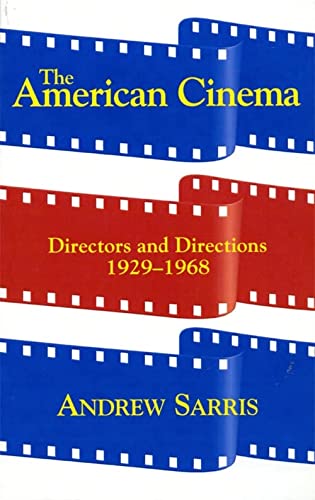Read this many years ago and am planning to re-read it. The part about the tension between the material and the artist never made much sense and Sarris never applied it during his movie reviewing career.
I am not a contrarian by nature but there are several points that require clarification among the many reviews of Sarris’ seminal “The American Cinema.” In an historical context, the book is of interest because he is an early proponent of the director as auteur theory.
Brilliant introduction to the movies. Writing style very entertaining, sharp and concise.
Enjoy reading about Hollywood. Been a movie fan all my life.
No book I've ever owned has influenced my life more than this one. It has remained in continuous use as a single very well-worn copy since purchased in 1974.
If you don't know this book, buy it immediately. It takes American film criticism up to about 1970 and coincides with the time Sarris was involved with the (real) Village Voice, Jonas Mekas, American Cahiers,and the founding of the NY Film Festival and the national society of film critics.
This volume parses the good guys from the bad guys, tells you whom you should love and why, and summarily dismisses the ones not worth taking seriously. In other words, for good or bad, it arms you, as will no other film book ever written, with a set of eloquently-stated prejudices that may seal off certain directors from your serious consideration for all time.
There are few books on cinema that are more important than this title. To any serious student of film this book is perhaps the only book that you will refer to as long as you watch films.
Extolling the virtues of The American Cinema would be too hard. Beside being an invaluable reference for cinema between 1929-1968, it also contains wonderful peices of film theory.
When it first appeared in the late '60s, Sarris' book was literally memorized by critics, students and teachers. It provided a root approach to discussing film, quickly absorbed, and readily shaped to one's personal tastes.
Auteur criticism is, in my opinion, a profoundly flawed theory of cinema that nonetheless was instrumental in emphasising the important role the director. Anyone not in the grip of a theory and aware of the myriad of factors that goes into the making of a good film has to realize that a vast array of factors goes into the final product.
Since 1973, when I bought the book for a college course, the book is a permanent part of my library. I should have replaced the original by now, but I owe to it my appetite and appreciation for movies.
This volume parses the good guys from the bad guys, tells you whom you should love and why, and summarily dismisses the ones not worth taking seriously. In other words, for good or bad, it arms you, as will no other film book ever written, with a set of eloquently-stated prejudices that may seal off certain directors from your serious consideration for all time.
The foremost American proponent of the auteur theory, Sarris has a lot to say about which directors are over-rated and under-rated. His overall view, shared by Manny Farber, that genre films are ignored in favor of forgettable prestige movies resonated with me.
